

Frances Haugen says Facebook's algorithms are dangerous. Here’s why. In her testimony, Haugen also repeatedly emphasized how these phenomena are far worse in regions that don’t speak English because of Facebook’s uneven coverage of different languages.

“In the case of Ethiopia there are 100 million people and six languages. Facebook only supports two of those languages for integrity systems,” she said. “This strategy of focusing on language-specific, content-specific systems for AI to save us is doomed to fail.” She continued: “So investing in non-content-based ways to slow the platform down not only protects our freedom of speech, it protects people’s lives.” I explore this more in a different article from earlier this year on the limitations of large language models, or LLMs: Facebook. Computer Hacking: Facebook Virus Prank - Making fun to your friend. Facebook. How To Permanently Delete Your Facebook Account. Looking to permanently delete your Facebook account?
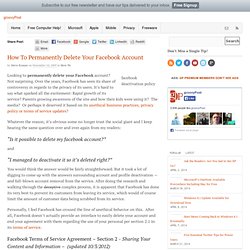
Not surprising. Over the years, Facebook has seen its share of controversy in regards to the privacy of its users. It’s hard to say what sparked all the excitement: Rapid growth of its service? Parents growing awareness of the site and how their kids were using it? The media? Whatever the reason, it’s obvious some no longer trust the social giant and I keep hearing the same question over and over again from my readers: Hacking Facebook User 'Access Token' with Man-in-the-Middle Attack. In Past years, Many Security Researchers reported various Oauth vulnerabilities to the Facebook Security team, but if the app traffic is not encrypted, you are not protected from the man-in-the middle attack and the attacker could steal your private information, using 'access token'.
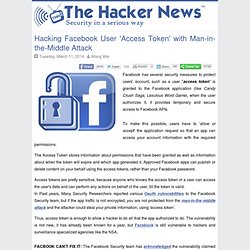
Facebook finally admits to tracking non-users. Nik Cubrilovic Blog - Logging out of Facebook is not enough. Important Update: Facebook has responded and issued a fix for this issue. See the follow up blog post "Facebook Fixes Logout Issue, Explains Cookies" Dave Winer wrote a timely piece this morning about how Facebook is scaring him since the new API allows applications to post status items to your Facebook timeline without a users intervention.
It is an extension of Facebook Instant and they call it frictionless sharing. The privacy concern here is that because you no longer have to explicitly opt-in to share an item, you may accidentally share a page or an event that you did not intend others to see. The advice is to log out of Facebook. Here is what is happening, as viewed by the HTTP headers on requests to facebook.com. Facebook tracks what you do online, even when you’re logged out. Updated 10pm Pacific with comments from Facebook.
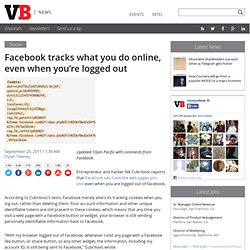
Entrepreneur and hacker Nik Cubrilovic reports that Facebook can track the web pages you visit even when you are logged out of Facebook. According to Cubrilovic’s tests, Facebook merely alters its tracking cookies when you log out, rather than deleting them. Your account information and other unique identifiable tokens are still present in these cookies, which means that any time you visit a web page with a Facebook button or widget, your browser is still sending personally identifiable information back to Facebook. “With my browser logged out of Facebook, whenever I visit any page with a Facebook like button, or share button, or any other widget, the information, including my account ID, is still being sent to Facebook,” Cubrilovic wrote.
“They definitely have the information stored,” Cubrilovic told VentureBeat in an interview today. On Facebook, deleting an app doesn’t delete your data from their system. Facebook announced some intended changes to its data use policy to "enhance transparency", according to a Friday post on its Facebook and Privacy page.

The updates include better explanations, examples, and "tips" denoted in the text with a lightbulb, as well as some revelations about how third parties deal with users' data. In the revised data use policy, Facebook makes explicit that any time one of your Facebook friends starts using an app, game, or partner website (that is, a site where you can log in using Facebook credentials), Facebook hands that service all of the "publicly available" information on that user.
Information that is always publicly available only includes basic stuff like your name or cover photo, but users can have their entire profile publicly available, and thus handed to a service. Not only does this data dance apply to direct users, it seems to apply to users' friends as well. Your friend might also want to share the music you “like” on Facebook.
Warning: Facebook sites luring women for naked 'selfies' A "selfie" posted by swimmer Stephanie Rice on Instagram and Twitter.
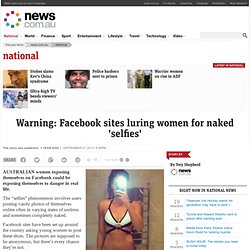
Source: Supplied AUSTRALIAN women exposing themselves on Facebook could be exposing themselves to danger in real life. The “selfies” phenomenon involves users posting vanity photos of themselves online often in varying states of undress and sometimes completely naked. Facebook sites have been set up around the country asking young women to post these shots. The pictures are supposed to be anonymous, but there’s every chance they’re not. A top internet expert warns they could expose women to cyber-bullying, that the photos could come back to haunt them in later life, and that it is even possible people could track down where these women live. Some fans of that page hint that they might know the women in the pictures. “This is a pretty big scene and a lot of it doesn’t come out until the media exposes it,” he said. “There are a lot of (selfies sites) in regional Australia. Facebook_experiments_on_users_they_ve_got_more_in_store.
Photo illustration.
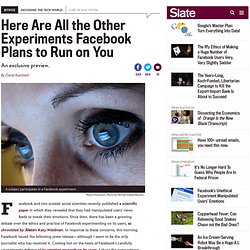
Photo by Michael Dalder/Reuters. Facebook and two outside social scientists recently published a scientific paper in which they revealed that they had manipulated users’ news feeds to tweak their emotions. Since then, there has been a growing debate over the ethics and practice of Facebook experimenting on its users, as chronicled by Slate’s Katy Waldman. In response to these concerns, this morning Facebook issued the following press release—although I seem to be the only journalist who has received it.
Coming hot on the heels of Facebook’s carefully unapologetic defense of its emotion research on its users, I share the press release as a glimpse of Facebook’s future directions in its user experiments. David Auerbach is a writer and software engineer based in New York. More on Slate Plus Thank you for participating in our important research, which has, in the words of our researchers, “manipulated the extent to which people … were exposed to emotional expressions.” TMI: Your Mood on Facebook Can Affect Your Friends.
The Debbie Downers in your Facebook News Feed are messing with your mood.
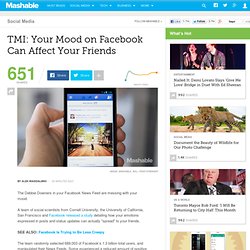
A team of social scientists from Cornell University, the University of California, San Francisco and Facebook released a study detailing how your emotions expressed in posts and status updates can actually "spread" to your friends. The team randomly selected 689,003 of Facebook's 1.3 billion total users, and manipulated their News Feeds. Some experienced a reduced amount of positive news on their feeds, while others experienced a reduced amount of negative news. Users with reduced positive news began to use more negative words, and users with reduced negative news used more positive words, according to Jeff Hancock, a professor at Cornell’s College of Agriculture and Life Sciences and co-director of its Social Media Lab. In addition to the "contagion" effect, the team also noticed a withdrawal effect, where people exposed to fewer emotional posts tended to post less expressive updates.
Wow. Facebook just did something amazing to crummy meme sites. And what they do next might shock everyone. The social media networking site Facebook recently rejiggered the algorithm it uses to determine what its users see highlighted on their “news feeds,” the center column of shared links, pictures and posts that determines most of what a user sees at the site.

There is a decent chance that this change will in large part determine what you read on the Internet in 2014. Maybe not “you,” the regular Salon reader or relative of the author, but “you” the person who clicked on this story because someone you know shared it on Facebook or Twitter. The purpose of the Facebook change was to encourage the sharing of more “high-quality” news content — that is, to make sure you are more likely to see it when “high-quality” news content is shared, because Facebook’s news feed algorithms do as much hiding as highlighting — and the result seems to have been an immediate decline in the traffic of all the sites that spent 2013 mastering the art of blowing up on Facebook. Facebook seems to have decided to. Wirklich? Germany declares Facebook ‘Like’ button illegal. The German government on Friday declared the Facebook “Like” button, which appears on countless websites accessible all over the world, in violation of the country’s strict privacy rights — and thus illegal.

An official from the German state of Schleswig-Holstein’s data protection center, Thilo Weichert, said the privacy violation stems from the Like button’s ability to track a person’s movement across the web, according to a report by The Local. In addition to violating German laws, Weichert claims the Facebook Like button also breaks European Union data protection laws. However, Facebook has rejected those claims and said any data that’s stored (like web activity from a unique IP address) is deleted after the industry standard 90-days, according to the report. VentureBeat has contacted the company for further comment. Facebook Says It May Be Allowing 'Too Much' Free Speech In Some Nations.
Facebook Mobile User Counts Revealed: 192M Android, 147M iPhone, 48M iPad, 56M Messenger. Facebook keeps user counts for its mobile apps hidden, but analyst Benedict Evans found a way to uncover them and they provide critical insight into the direction and performance of Facebook’s mobile efforts. Most interestingly, Facebook’s Android user count is growing much faster than its iPhone user base, but is found on a lower percentage of Android devices. Let’s take a closer look at the data. A year ago, Facebook stopped reporting user counts for its own mobile apps via the Graph API. But if you searched for one that none of your friends used and hovered over the search result, you could see its monthly active user count (MAU). Evans of Enders Analysis meticulously recorded until “some time in November [2012], those disappeared and were replaced” with hover cards lacking the usage data, he tells me.
Evans gave me the raw data dump from his research, which is more current than his blog post, and here’s what it shows. iOS vs. This all leaves out the iPad, though. Facebook email: pointless endeavor, spammer's dream, or both? Seriously, Facebook? As you may or may not have heard, Facebook made the decision recently to pull the ol' switch-a-roo on many of its users by making their default email address an @facebook.com email address, instead of whatever they had beforehand (see: Fixing the Facebook e-mail foul-up). In this post, I'm going to discuss why Facebook email is a completely pointless endeavor, as well as why it may well be a spammer's dream come true. Pointless Endeavor. Facebook ‘like’ button declared illegal. Everything We Know About Facebook's Secret Mood Manipulation Experiment - Robinson Meyer. Updated, 09/08/14. 11 Facebook Marketing Tools to Help You Optimize Your Page.
Agorapulse: Social Media Management for Facebook, Twitter & Instagram. News Feed FYI: Helping You Find More News to Talk About. By Varun Kacholia, Engineering Manager, and Minwen Ji, Software Engineer The goal of News Feed is to show the right content to the right people at the right time whether it’s from a close friend or a news source halfway across the world.
In the last year, more people found news on Facebook than ever before. In fact, as reported in October, average referral traffic from Facebook to media sites has increased by over 170% – almost tripled – in the past year. Today’s update to News Feed ranking recognizes that people want to see more relevant news and what their friends have to say about it. More relevant articles in Feed. Annuaire des pages & groupes Facebook. L'évolution de Facebook en 10 ans: comment le réseau social s'est-il transformé depuis ses débuts? Facebook va lancer une nouvelle version professionnelle de son site pour concurrencer LinkedIn.
Facebook : « Commentaires et mentions j'aime », que faire ? Facebook a introduit de nombreux changements ces derniers temps, comme nous avons pu le voir au sein de notre dossier sur les abonnements et les nouvelles listes, ou encore à l'occasion de la conférence F8. Comme toujours, cela nécessite quelques adaptations, notamment à cause de l'arrivée du « Ticker ». En effet, depuis quelques jours, on peut voir le statut-chaîne suivant se balader de comptes en comptes sur le réseau social : « Suite à la nouvelle version de Facebook, qui arrive doucement, mais surement chez tout le monde, vous seriez gentils de faire ceci : Passez la souris sur mon nomAttendez de voir la petite fenêtre s'afficherPassez la souris sur abonné(e) et décochez « Commentaires et mentions j'aime »J'aimerais ainsi que les commentaires de mes amis et ma famille ne soient pas rendus publics ! Merci !
Les chaînes : c'est le mal. Autant le dire clairement, ce message n'a pas de sens. Comment créer une page Facebook? Avez-vous pris la décision de créer une page facebook? Voici un petit guide contenant les étapes à suivre pour y parvenir: Création: Tout d’abord, allez à la page de création de pages: vous obtiendrez ces options: Sélectionnez le type d’entreprise que vous avez, indiquez le nom de votre entreprise, lisez les conditions applicables aux pages Facebook et si vous êtes d’accord, acceptez.
Remplissez les informations, téléchargez votre photo de profil et sélectionnez si vous voulez ajouter votre page à vos favoris (je vous recommande d’accepter). Lorsque vous avez terminé cette étape, vous serez redirigé vers votre nouvelle page. Dans la section d’administration, sélectionnez: Modifier la page et visitez chacune des sections pour y remplir chaque espace avec les informations de votre entreprise. Informations sur la page: En fonction de la catégorie que vous avez choisie, vous aurez des espaces à remplir avec l’information de votre entreprise.
Ensuite, vous pouvez y ajouter des applications. Facebook, trop c’est trop… Comment sécuriser son profil Facebook ? Facebook vous agace ? Rendez-lui la pareille. Facebook: si vous voulez moins d'amis, l'application "Duster" va vous aider. RÉSEAUX SOCIAUX - Malgré ce que votre profil Facebook indique, il est assez peu probable que vous ayez des centaines (des milliers?) D'amis avec qui vous voulez absolument rester en contact. En fait, si vous êtes sur le réseau social depuis longtemps, il y a même de fortes chances que certains "amis" vous soient aujourd'hui totalement étrangers... Alors plutôt que d'ajouter des amis, si vous êtes prêt pour un petit nettoyage de printemps sur votre profil, cette application Facebook -Duster- est faite pour vous. Développée par Carter Wheatley et Adlai Gordon, deux étudiants en informatique de l'université de Boston, cette application se connecte à votre compte Facebook et sélectionne les personnes avec qui vous n'avez pas interagi depuis quelques temps.
Bien sûr, ce n'est pas parce que vous avez oublié de souhaiter un anniversaire à untel ou envoyer un message à un autre que cela signifie forcément que vous voulez cacher ou supprimer ces amis...